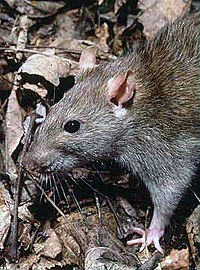 |
| Blame the rats |
Following the fire, the National Emergency Management Agency organized inspections of 4,955 buildings across the country, discovering that over 20 percent had non-functioning sprinklers or were inadequately protected against fire. Numerous safety violations were cited in the resulting report.
Over the last two years, fires in apartment buildings have killed 86 people and injured 555, but most importantly the resulting financial losses to businesses were 20.8 billion won. The Minister of Construction admitted to us that "people die all the time, but clearly financial losses to the country’s businesses need to be avoided." The losses would be much higher if people were not discouraged from having property insurance, but fortunately Korea’s insurance industry is fully aware of the potential risks of insuring the nation’s badly-built homes.
No figures are available for the number of people killed by accidents resulting from poor construction quality. However, statistics recently discovered at the bottom of a locked filing cabinet in a disused lavatory within the Ministry of Health and Welfare show that last year under the category of fatal household accidents, 9,036 people died from electrocution within their apartments, 484 from fitted oven-related explosions, 204 from ‘gravitational failures’ (which further investigation revealed comprised of ‘internal structural collapses’ and 32 incidents designated as ‘floor failures’), 83 suicides were attributed to gas poisoning, 62 suicides were logged after the victim ‘unscrewed’ their balcony rail or full-length window fitting before jumping to their deaths, 26 single people died after becoming trapped in their bathrooms, 20 people disappeared leaving their garbage disposal units on, and 12 people were killed by ‘exploding door handles’ though there was no further explanation for this. The little-read left-wing newspaper The Hankyoreh has even alleged that the high number of deaths this year attributed to ‘weather-related’ accidents seem to mainly have occurred beneath tall buildings, fueling suspicions that the ‘concrete-rain’ phenomena of recent years may not originate from China as the Korean Meteorological Association has claimed.
Some say that with growing numbers of people sharing stories online, it is becoming much more difficult for Korea’s chaebols to claim that the nation’s apartment blocks are the safest and most harmonious in the entire world, but a spokesman for the Korea Chaebol Construction Association (KCCA) has reacted angrily to recent attacks on it by citizen groups. "Our employees work 16-hour days, often long into the night in stifling heat and biting cold, on apartments they could never afford themselves, just to make sure that people have somewhere to live quickly. Before they complain, people should think about how many of our workers have died to put them in apartments that enhance their prestige." Indeed, Korea has the highest number of construction deaths attributed to suicides, alcohol-related accidents and 'Newtonian incidents' in the OECD, although the KCCA dismiss this as reflective of the large number of construction projects going on due to Korea's superiority over other nations.
The KCCA is also angry that the National Emergency Management Agency’s investigation has broken long-standing financial agreements between the chaebols and local building inspectors to pass any building leaning at less than a ten-degree angle as safe. The National Building Inspectors Union has threatened to strike if they can no longer supplement their incomes with ‘appreciation payments’ from the chaebols. Citizen groups refuse to be silenced however, claiming that that long working hours and a culture of corruption are leading to more deaths than are acceptable.
In an attempt to reduce the unfounded criticisms against them, the construction chaebols say they have investigated the large number of fires occurring in their buildings and found that almost all of them are caused by rats. A chaebol spokesman told us "It is well known that rats often gnaw on wood or cables. Rodents’ teeth grow continuously and they nibble on surfaces to maintain the length of them. As they gnaw electrical cables, they can cut off electricity or induce sparks, resulting in a fire." The construction chaebols have asked Korea’s media chaebols to ensure that people are made properly aware of the facts. "In future, when there is a fire, rather than blaming Korea’s construction companies just because they built their apartments, people should understand that its probably rats which are to blame" added the spokesman.
A university lecturer was arrested recently for spray-painting the image of a large rat representing the President on several G-20 posters.
Related Links
413 tall buildings fail fire check
Surging number of rats invading homes in Seoul
Arrest warrant for drawing rat on G20 promotion poster
Disclaimer: Please note the links above are generated automatically by our software and may not always be directly related to the news article.